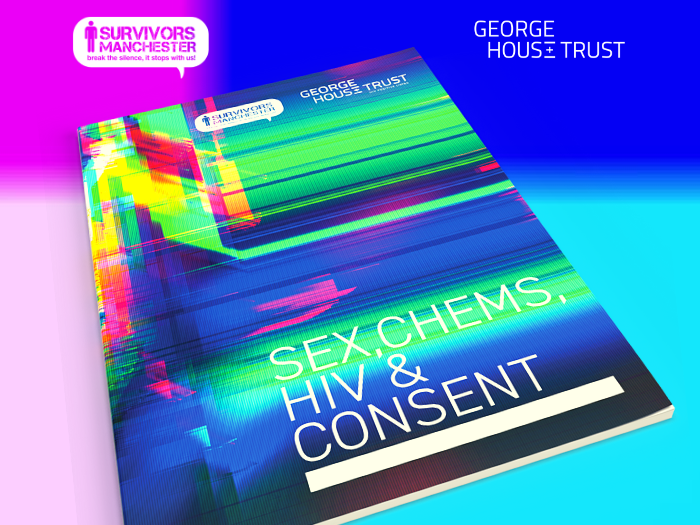Two Manchester charities have collaborated with an anthropologist and drag queen to break new ground on the often misunderstood world of chemsex.
The report titled ‘Sex, Chems, HIV & Consent: An Enquiry’ was authored by Dr Michael Atkins, also known as drag queen Cheddar Gorgeous, supported by Survivors Manchester and George House Trust.
The aim of the report is to educate, break down the stigma and advocate for a harm reductionist approach.
The term ‘chemsex’ refers to drug facilitated sexual activity, most commonly encompassing the use of Methamphetamine, Mephadrone and GBL (liquid ecstasy), although views shared by participants in the report showed that exactly what chemsex entails was different for every individual and group.
Survivors Manchester and George House Trust sought to gather more information on the relationship between chemsex and consent, as events surrounding drugs, sex and sexual assault in the LGBTQ+ community led to the perception that chemsex is an innately dangerous activity conducted between strangers.
Survivors Manchester
Survivors Manchester was founded in 2009 by Duncan Craig OBE and provides support services to boys and men affected by sexual assault. More than 1,500 men access their services every year, and they advocate to change societal perceptions to male victims of sexual violence.
Duncan was inspired to set up Survivors after experiencing sexual assault in his own life, and while training to be a therapist noticed there was a gap in support being offered specifically for male victims of sexual assault.
George House Trust
George House Trust is a charity that supports people living with HIV by providing HIV support, advice and advocacy services.
They provide direct support to nearly two and a half thousand people living with HIV, as well as campaigning for greater awareness and wider societal change.
Darren Knight, Chief executive of George House Trust, said: “We were originally set up in the mid-1980s as Manchester AIDS Line, and were founded because people living with HIV were dying and there wasn’t the support, treatment, information or networks around to help people at that time.”
This report is an extension of their work as they expand knowledge and education into new sectors including chemsex.
Dr Michael Atkins/Cheddar Gorgeous
Dr Michael Atkins is the author of the report, which uses focus groups and interviews to gain new insights into the world of chemsex. He’s been an ambassador for George House Trust and has known Duncan from Survivors Manchester since he started the organisation.
Dr Atkins is a researcher and anthropologist who’s previous work has focused on investigating the world of male sex work. This background with the two groups informed his motivation for carrying out this new report unto chemsex.
Michael said: “We noticed problems unique to the area each organisation was part of, and when you work with an issue, say – around chemsex or around consent or around the welfare of people living with HIV, we started to appreciate that there were certain crossovers and intersections and certain worlds where those risks collided. The world of chems and the world of sex mediated with drugs was one of the worlds.”
Dr Atkins may be more widely known by his drag persona Cheddar Gorgeous who appeared on Season four of RuPaul’s Drag Race UK. It may seem a far cry from the world of academia, but experience in this arena gave Michael some initial insight into the impact of chems on the LGBTQ+ community.
“This has taken place in nightclubs and from a personal perspective there have been people who have come and gone from my life – and gone in a very final way.”
Michael/Cheddar said. “There have been people who you would simply no longer see on a night out and it would only be weeks later or months later that you would find out they had passed away, or that person is not doing too well and they’re becoming a bit too embroiled in the party scene.
For me it’s about recognising this nexus of risk that it’s really important as a community we take a look at.”
Misconceptions about chemsex
A scene that is largely underreported on, many people have a warped perception of what chemsex is and how the community is formed.
Dr Atkins said: “Some people will go into it with an idea they have around chemsex. That it’s innately wrong, debased, littered with people that have mental illness, littered with people who are engaged with risky activity, people who are into hurting themselves. Viewing chemsex in that way is completely unhelpful and completely inaccurate.
“There are many people who engage with chemsex and they do so in a way where they’re able to maintain a very normal, very happy, very healthy life. On the opposite side of that you also have a perception where people don’t quite understand all of the risks sometimes.
“We need to start being more open in acknowledging both of those things. That’s really where we start being able to make informed decisions about what’s good for us, what’s good for our communities and actually how we start to provide help to those people who need it.”
While many participants in the report acknowledged the role of dating apps like Grindr in meeting new people, they emphasised the importance of a familiar setting with established, trusting relationships as well as communicated boundaries.
The decision to engage in chemsex is often not one taken on a whim. Anonymous respondent from the report, J, outlined how he started smoking weed with friends from his hometown, which gradually expanded into MDMA and ecstasy, before moving onto ketamine and mephadrone, drugs that are readily available and associated with chemsex.
Each of these steps led to an expansion of boundaries, representing a new act J would or would not participate in.
A common theme was the entwinement of sex and drugs over a long period of time, encompassing different settings and relationships.
Chemsex and consent
Informed and affirmative consent can be complicated in sexual settings involving drugs.
Duncan from Survivors Manchester said: “The moment people engage in alcohol use or any kind of drug use there is a lowering of boundaries so how do we engage in conversations about boundaries when people are intoxicated?
We began to see a lot more people stepping forward where consent had been questionable for them during chemsex activity.”
A lack of affirmative consent in chemsex settings was signposted by participants. The norm is an unspoken consent which can lead to uncomfortable situations. All users from the report discussed incidents of seeing people engaged in sexual activity with another person they were not sure was conscious.
Coercion in these spaces can manifest not just from people being in a state of inebriation, but also from the lack of definition and vague feelings of obligation.
A pressure to maintain supply of drugs, or a lack of knowledge about what drugs would be used or what a certain event may involve can all contribute to a decreased capacity for informed consent.
Consent during chemsex is further impacted by feelings of guilt participants can experience, describing feelings of responsibility for getting themselves into a place where they were unable to look after themselves.
Duncan added: “We’ve always recognised that there’s a very thin line between where people believe consent is present and when people may have a different idea of consent and the messiness that can come with that.”
Anonymous source from the report, D tells his story of the intersection of chemsex and consent in the report. D is a former chemsex participant, who’s drug use began before the days of location based dating apps.
In his early years he was open-minded to using a range of drugs in a sexual context, including crystal meth, mephedrone, cocaine and G. D fell in with a small group of around 4 people and fell into a regular pattern of weekend use.
D moved to London and lost touch with this Manchester-based group after a serious sexual assault that occurred after he was spiked at a bar. D describes the difference in the London and Manchester scene, noting that London was far more open and tolerant of chemsex.
He also highlighted how drugs came to be a double-edged sword, both giving him the confidence to re-enter sexual settings following his assault, but also becoming a crutch to deal with on-going trauma from the incident.
The relationship between chemsex and trauma was echoed by participant W. W began using drugs after experiencing sexual abuse at a Catholic boarding school. Similar to D, drugs have protected him in some way, while also facilitating further harm.
Like Darren and those at George House Trust, Duncan hopes this report can lead to a more honest discussion of chemsex in the mainstream.
He said: “There needs to be a conversation about this. The harms that come are because we don’t talk about it, because we don’t have conversations.
“There are certainly conversations to be had in communities engaging in chemsex, but also in sex work communities and heterosexual communities where the use of drugs and alcohol in facilitating sex is potentially problematic.”
Perceived risks
All participants discussed and showed knowledge of the potential dangers of drugs they were using, as well as some measures they took to ensure harm reduction. These included knowing their doses, only using from trusted sources, setting strict limits and taking care not to mix drugs and alcohol.
Participants felt that the lower inhibitions that provided a feeling of assurance and confidence, could also heighten the potential for sex without a condom, increasing the risk of spreading sexually transmitted diseases including HIV.
All participants who reported to be currently using chems, were also all on PrEP (Pre Exposure Prophylaxis) to reduce their risk of contracting HIV, which was something they frequently talked about and encouraged friends to research. However, PrEP does not protect against other sexually transmitted diseases.
Harm reduction strategies
The report suggests a range of harm reduction strategies to open the conversation about how to make chemsex safer for those involved.
A strategy for harm reduction signposted by Dr Michael Atkins is for those using chemsex to have relationships and obligations that prevent them from using too much or too frequently. He said:
“The idea that having relationships in your life and things to do in your life and other things that add value in your life, that can help you to avoid getting into difficult patterns of drug use that may have an impact on your mental health.
“They described how they’d seen friends in the scene lose it, they’d known people who had died and they had seen people lose their mental well-being from being involved in the scene.
“They said for them the important thing was they had each other, they maintained the idea that they had to get up for work, they had a job to go to, they had people to meet for lunch. It was those tethers and other important parts of life beyond sex and drugs that helped keep people safe.”
A support network is not the only thing that can help to prevent dangerous or excessive use of chems. Michael pressed the importance of education:
“There are absolutely ways you can reduce the risk involved in using particular drugs so let’s actually start talking very specifically about different kinds of drugs, different kinds of sex.
“In many ways, the term ‘chemsex’ itself becomes an incredibly unhelpful black box that prevents us from examining what drugs are involved, what are the specific risks for specific substances and how do you mitigate them.
“If we’re talking about a specific drug like GBL/GBH there are absolutely ways you can try to make that safer, in terms of timing dosage, in terms of being clear that this is a very dangerous drug if misused. Yes there are ways of mitigating that risk but there’s also a need to be honest about the fact that that risk exists.”
Darren added to the importance of education, beyond chem users. He said: “The big recommendation for organisations was training, for organisations where there’s people doing front line work, such as hospitals, doctors surgeries, sexual health clinics.”
Michael echoed concerns about what happens when organisations lack specialist knowledge or language: “Organisations are very scared to say anything around these issues because on one side if they’re seen as being too liberal and too accepting of things like chemsex, they’re accused of somehow being collaboratively involved in condoning action.
“And yet, if they’re seen as being too harsh they become part of the system of persecution for those people. They become part of something patronising and are not able to engage with people as they’re seen as being very judgemental.”
But education and harm reduction can only happen in the absence of stigma or judgement.
For many, admitting to being involved in chemsex, even within the Queer community, could open them up discrimination or loss of social position.
Duncan said: “Nobody wants to appear less than, and if in speaking about something there’s a fear that someone will view you as less than, then it makes sense that people wouldn’t speak out.”
He added that an abstinence only or shame focused response would not help those who have experienced problems in this arena. He said:
“The conversation needs to be harm reductionist. Telling people not to do something isn’t necessarily the way forward. What we need to do is give people as much information as possible and help them understand the risks associated with this.
“We need to have more sex positive conversations and we need to break away from the stigma and the shame that’s often attached.”
Duncan also provided some professional advice to people who want to be an ally and support positive solutions:
“Really know your stuff. Have conversations with your loved ones about consent and let’s not go back to the ‘just say no’ days, let’s talk about harm reduction in the best possible way, and recognise that sometimes people are engaged in activity that we don’t necessarily want them to be engaged in as a society , but the best thing we can do to help them is reduce harm as much as we possibly can.”
Survivors Manchester and George House Trust have contact information across all their social channels for anyone seeking more information or has been affected by the issues raised.
The full report from Survivors Manchester, George House Trust and Dr Michael Atkins/Cheddar Gorgeous can be accessed here.




